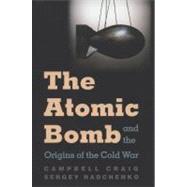
Note: Supplemental materials are not guaranteed with Rental or Used book purchases.
Purchase Benefits
Looking to rent a book? Rent The Atomic Bomb and the Origins of the Cold War [ISBN: 9780300110289] for the semester, quarter, and short term or search our site for other textbooks by Campbell Craig and Sergey Radchenko. Renting a textbook can save you up to 90% from the cost of buying.
Campbell Craig is professor of international relations at the University of Southampton. He lives in Salisbury, England. Sergey Radchenko is a tutorial follow in international history at the London School of Economics. He lives in London.
| Acknowledgments | p. vii |
| Introduction | p. ix |
| Franklin Delano Roosevelt and Atomic Wartime Diplomacy | p. 1 |
| The Great Game | p. 34 |
| Truman, the Bomb, and the End of World War II | p. 62 |
| Responding to Hiroshima and Nagasaki | p. 90 |
| The Baruch Plan and the Onset of American Cold War | p. 111 |
| Stalin and the Burial of International Control | p. 135 |
| Conclusion | p. 162 |
| Notes | p. 171 |
| Index | p. 197 |
| Table of Contents provided by Ingram. All Rights Reserved. |
The New copy of this book will include any supplemental materials advertised. Please check the title of the book to determine if it should include any access cards, study guides, lab manuals, CDs, etc.
The Used, Rental and eBook copies of this book are not guaranteed to include any supplemental materials. Typically, only the book itself is included. This is true even if the title states it includes any access cards, study guides, lab manuals, CDs, etc.